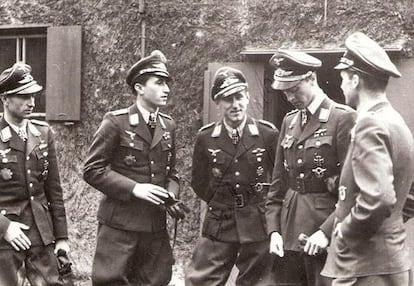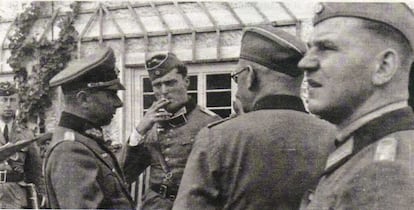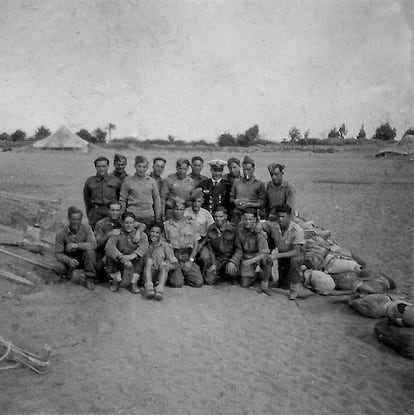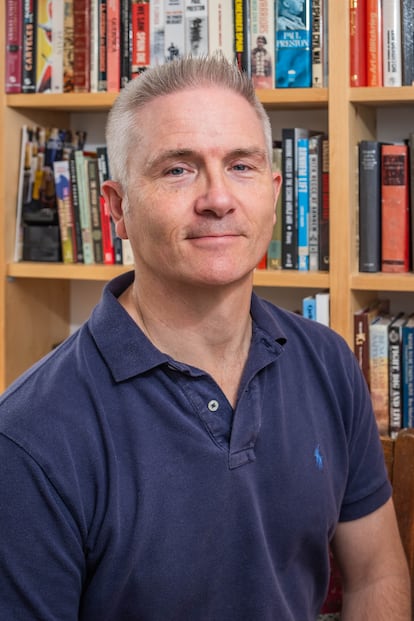It is already a curious thing that the other day he went to find a handful of Hitler heroes in the presentation of a book on Spanish Republicans who fought, many of them with extreme value, in the ranks of the British army during World War II. I went to the Barcelona Library Alibri (former Herder) to congratulate Séan F. Scullion for the Spanish publication of his magnificent book Spaniards against Nazismwhich has edited Espasa after appearing in English (Churchill SpaniardsHelion & Company) last year and arouse the logical interest in our latitudes. I arrived late, as a ground because of my hectic life of a journalist (I even managed to arrive on Wednesday to Altaïr for a presentation that I made myself) but I had the immense pleasure that I know, with which we have made friends, I dedicated my book and give me a strong and martial hug (Scullion is a Lieutenant Colonel of the British army and hugs as if it convenient you).
He explained that the presentation – in the underground section of psychology and psychoanalysis of the bookstore, which is already a place to talk about the value – had gone very well. The journalist and writer Raúl Montilla, who officiated the act, said that Séan’s book “not only recovers the history of those soldiers, but returns the voice and dignity to those who fought for a democratic Spain.” He recalled that that of the book is the story of the more than a thousand Republicans who joined the British army to continue fighting fascism during World War II. He pointed out that they are “not limited to counting battles but explains lives”, and stressed that in a world in which the extreme right returns to Campar to its wide, memories like these are not a luxury but a necessity.
Among the people who came to the presentation, I was surprised to meet an individual who carried a British warrior of the second contest with command badges. I thought he was someone who had lost looking for a reenactment, A historical reconstruction of battles, something unusual in the Alibri Psychology section, but I know it took me out of my mistake. “He is Victor Asensio, Manuel Buesso’s grandson, and carries his jacket, in his honor.” My mother, Manuel Buesso! What kind. He fought on the front of Aragon, escaped a Francoist field, enlisted in the foreign legion, fought the Nazis in Narvik, became part of the British army as a member of the Spanish Company 1 and became a sconce, By the name of the operation of the Special Operations Service, the SOE, aimed at invading Franco’s Spain. In fact, in the presentation of the book, which was also attended by the daughter and niece of Agustín Roa Ventura and a relative of Alfonso Canovas, there were more relatives of brave than in an act of tribute in Navarone.
There were also military historian Pere Cardona (the author of the great Bears, atoms and spies, surprising stories of the cold war, Main of the books, 2021) and a guy who at the beginning did not recognize but that turned out to be Jesús Hernández. Jesus, who has become a reference disseminator over World War II and has published almost thirty books, I met in 2005 shortly after getting the first, The hundred best anecdotes of World War II (Unpublished, 2004). We hadn’t seen each other again in twenty years. We are more changed than if we returned from the Eastern Front. He explained that I was a friend of several of those present and ended up telling me with his usual sense of humor how he arrived last June to the Playas de Normandía, pointing to some acts of commemoration of day D, from a landing boat that was balanced causing a mortal dizziness. “At least the German machine guns did not shoot us,” he sighed.
Jesus has had the detail of sending me one of his books – “Surely you will like it” – with the hairy title of Hitler’s heroes (Almuzara, 2020). It is the most different thing that may be to the book of Séan: a compendium of stories of bold characters of the III Reich. I was surprised to see that the usual faces were not in these cases, Rudel, Galland, Wittmann. But Hernández has chosen to look for less known characters and meanings, a lower profile to understand us.

The selection is unequal, the paratrooper von der Heydte is very seen, General Theodor Scherer has no more funny than being one of the few high German commanders who had a beard and Eduard Dietl, head of the troops in Narvik, precisely, is not what we would strictly consider a hero. The Corsaary Captain CormorantDetmers, is also a bit with a shower (basically to explain the mystery of the disappearance of the cruise Sidney). On the other hand, put Hanna Reitsch, a brave woman without a doubt, but whose most outstanding war action was to say goodbye with many tears, rrets and siegheils Hitler in the bunker of the Foreign Ministry besieged by the Soviet, is not like to throw rockets (and is worth the reference to the V-1 and V-2); For me that responds rather to look for female fee.
But a handful of interesting types appear. Among them, the skilled and daring Geistersegler or “Ghost Sailors” of the Abwehr Christian Nissen and Heinrich Garbers, both of the special or Brandeburgers services, which were dedicated to introducing by sea spies and sabotadores in Great Britain and even in Canada, South America and South Africa, often using the KriegsfisfisfisfisfisfisfisfisfisfisfisfisfisfisfisfisfisfisfisfischkkkkkkkkkkkkkkkkkkkkkkkkkkkKKKKKKKS (“War fishing boats”) and other times tuna or recreation sailboats. Garbers (awarded with the precious cross of Caballero), highlights Hernández, ended up being the German war Admiral Scheer.
Jesus shows a weakness for Konrad von Leipzig: is what he has known to the family and that the officer, also of the Brandeburgers, He lacked a leg, amputated from the hip after suffering a wound in Lithuania. Ah and his brother was Rommel’s driver. Von Leipzig, despite his mutilation, headed an adventurous clandestine operation in the desert that took them and his command to briefly ally with the Tubus, enemies of the Tuareg in Tibesti, and to attack a fort of the foreign legion. He was then destined in Croatia and Tito reached the price at his head. Finally, he was committed, officially for the pain of the amputation, but possibly for his very little convenient friendship with Von Stauffenberg, author of the July 20 attack. Jesus places in his selection some paratrooper awarded in battle (Sergeant Heinrich Schäfer, who unusual the Cruz de Caballero came by mail to the prison field after his capture), and von Fölkersam, a lieutenant of Skorzeny, who on one occasion disguised his soldiers of NKVD members, with how little they were condescending. Costumes

I also have some heroes that served on the German side, including Roland von Hösslin, who fought bravely in North Africa, won the Cruz de Caballero, was badly injured and then the Nazis themselves hanged him for complicity in Stauffenberg’s attack; And I also value the Count of the Bomb. Put to choose German heroes I also lean for two aristocratic Aces of the Aviation of Night Hunting, the princes (both were) of the darkness Heinrich Zu Sayn-Wittgenstein (it is said that he planned to kill Hitler when he died; he died shot down before) and Egmont Zur Lippe-Weissenfel. Both had to have problems when marking their flight costumes and were very stretched, but it seems to me that, aligned on the wrong side, at least they defended the civilian population of their country against the brutal allied bombing.
Of course, the debate about good or bad German soldiers is absurd. Actually they all served a criminal regime and with their struggle they extended its terror. Someone said, and was not wrong, that the true good Germans were Hitler’s first victims and that the Nazis filled the concentration camps before even starting the war. Every minute you earned for the III Reich fighting in their ranks during the contest, however brave and honorable you were, you kept the gas cameras and the crematoriums already Hitler in command. And that as much as your conscience hated the Nazis, that you were against (private) Atlantis or a nice rebel granuja like the young As Hans Marseille.
Hernández adds a significant epilogue to his book under the title The other German heroes In which he explains, among several more, the history of marriage formed by Otto Hampel and Elise Lemme who exercised resistance in Berlin leaving anti -regime postcards in crowded places. Arrested by the Gestapo, they were decapitated to both of them in 1943 (their history, novel, Hans failed in the classic Only in BerlinMaeva, 2011).

In purity, the only good German military heroes – if we except those who fled to fight in the allied ranks, most of them Jews – are those of fiction: the skeptic sergeant Steine The Iron Crossor the antihero holder of the novels of Sven Hassel, a usual of these pages. It is true that put to be rigorous, many of our heroes of all time do not pass the cut: some served totalitarian regimes, others to colonial powers. Few hussars, musketeers or Bengal lancers contributed to the world better, except for adventure books.
Being has no doubt instead that their characters were heroes, of the good ones, and is worth the polysemy. Putting to highlight, he chooses the epic history of Malaga Francisco Gerónimo: Battle of the Ebro, foreign legion, flight to Egypt, Middle East Commando, one of the last defenders of Crete, evasion of the Nazis for 11 months by the mountains of the island occupied under the name, worthy of Paddy Leigh Ferm, of Kosta Spirachi; Rescue in Extremis by the SOE, paratrooper, member of the SAS in operations in France and Italy … Of course, what tranquility gives fight for the correct cause.

